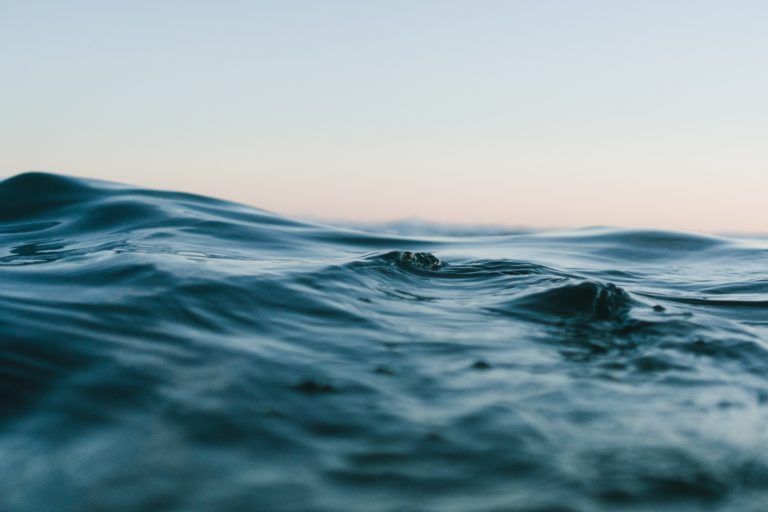A theological reflection by Osheta Moore
I once heard a story about Harriet Tubman that I’m sure is exaggerated and therefore mythologized. Quite often in the retelling of their stories our favorite heroes move from ordinary people who were brave enough to show up in extraordinary circumstances to superhuman badasses the likes of which we’ll never be.
This story is about one of Harriet Tubman’s trips to lead a group of enslaved people to the North. After a few days of traveling, they heard hounds baying and in pursuit, so they moved their caravan to the river where they hid for several days. They slowly trudged in the water, taking rests when they could, keeping an ear out for the barking of the dogs and the gallops of the slave patrol on their horses. They were hungry, thirsty, sore, and cold. The children and babies struggled to hold in their whimpers. The group was tense— anxious as they made their way to freedom, exhausted from the hard journey.
‘Wade in the Water” they knew told them to stay in the water so as to confuse the bloodhounds used to track them— but singing something on the plantation while you harvest and process the cotton and actually living it are two very different things.
Wading is messy. Wading is dangerous. Wading is confusing. Wading often makes you long for the solid ground of the plantation—at least that’s a discomfort you’re used to.
One man stopped abruptly and the procession behind him stuttered to a halt. Some of his fellow journeymen fell into the water making a dangerously loud splash. Harriet whipped around and glared at the man, “hush now” she hissed. The man, dripping with water and rage, walked up to Harriet and announced he was leaving the group. He was done. He would go back to the plantation and throw himself at the mercy of the master and whatever fate becomes him has to be better than this hard slog to the “promised land”. Harriet looked around at the group and knew if this man went back, if he got out of the water and alerted the men searching for them of his presence the whole group, herself included, would be done for.
As the story goes, Harriet pulled out a gun from the pocket of her skirts, pointed it squarely at the man’s forehead, and said, “You have a choice then, die now or keep walking. We’re getting freedom and you will not stop us.” Harriet cocked her weapon and waited. The others in the group began to whisper their pleas for him to stay, some appealed to his sense of self-preservation, “You don’t want to die!” Some reminded him of the ways the overseers beat him mercilessly. Some begged him to not cause a ruckus and get them all caught. Harriet stood quiet and resolved, revolver ready. The man looked around and realized that suffering together for the sake of freedom was far better than dying in that hypothermic river, so he held his hands up, apologized to Harriet Tubman, his Moses from the oppression of the plantation, and got back in line. He returned to wading in the water— even though it costs him his comfort and even though he had very little hopes for the journey.
Peacemaker, we’re called in the wade in the waters of injustice and in a lot of ways, we can be like the exhausted and discouraged man. Partly because I’ve heard (and been guilty) of thinking that creating a world that is more just, more beautiful, more peaceful, requires that our focus is on what we do. We focus on “read this, say this, protest here,” as we are always shame-laden and hustle-bound. Belovedness, however, undoes our striving and proving and if there is one thing our culture of effecay reinforces, it is a scarcity mindset of identity and worth.
This is partly why we get exhausted in our peacemaking, my Friend. We’re actually peacekeeping— constantly proving oour worth and unsure of how to measure our efficacy. What if we waded in the waters of our belovedness? What if we leave the hustle do more and embrace the hope being made whole so that we can help make the world whole? What if in our peacemaking we focus on owning our Belovedness, proclaiming the Belovedness others, and working to become the Beloved Community? This shift has been the greatest and most sustainable move I’ve made in my peacemaking. Becoming at peace within so I can create peace around me.
This is an excerpt from Osheta’s book, Dear White Peacemakers (Herald Press, 2021).

Osheta is an ESFJ mama who loves parties, people, and popcorn with red wine. A pastor who is convinced God has a sense of humor. A Peacemaker who loves Jesus a lot and cusses… a little. An optimistic cookbook reader. A hopeless romantic and a goofball with a little bit of sass. She regularly conspires with Global Immersion in forming Everyday Peacemakers and Reconciling Leaders. Learn more about Osheta at osheta.com.

